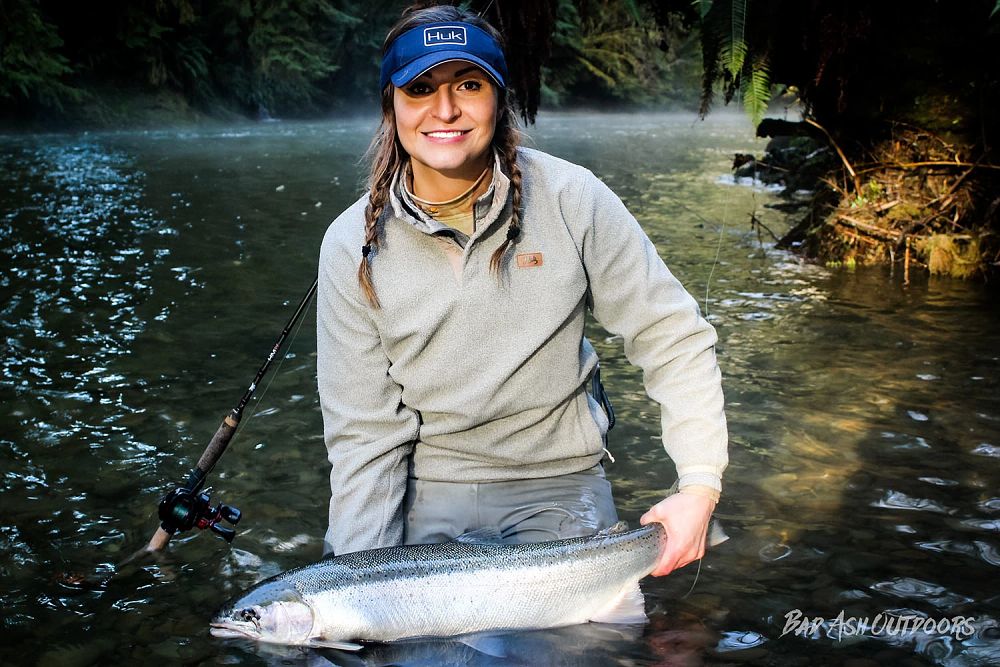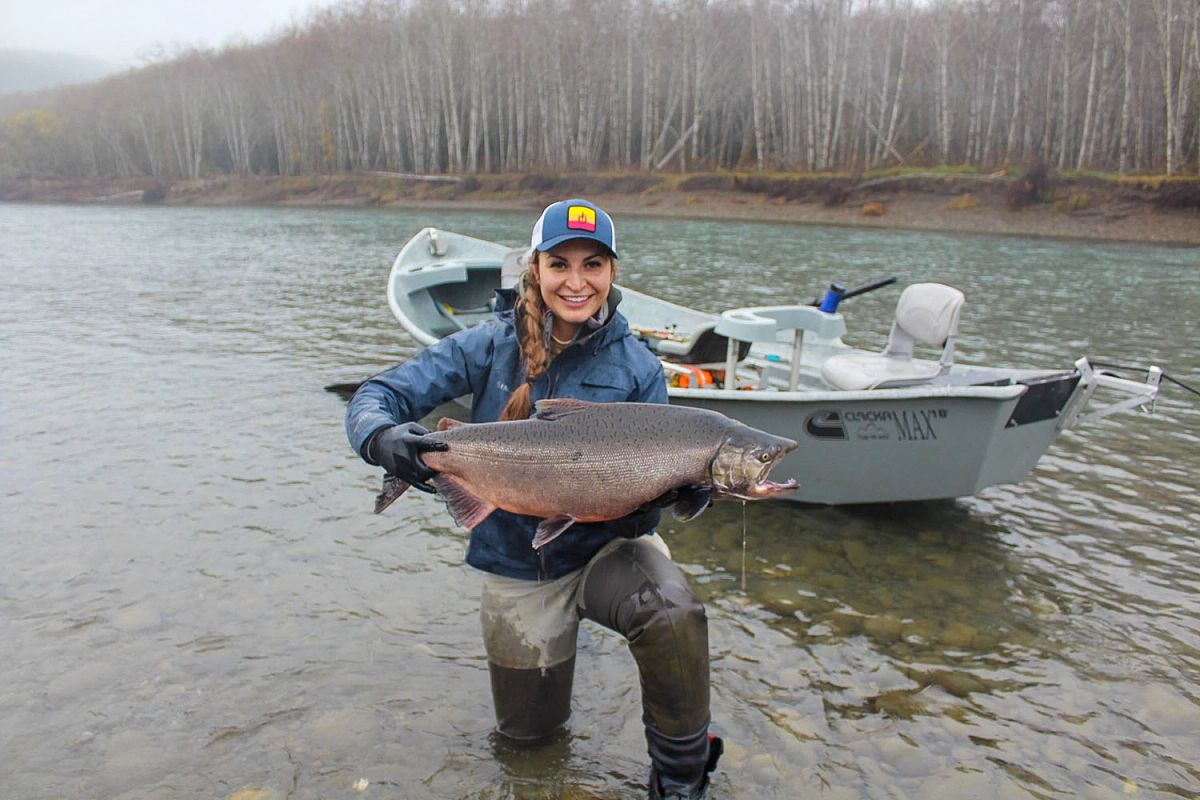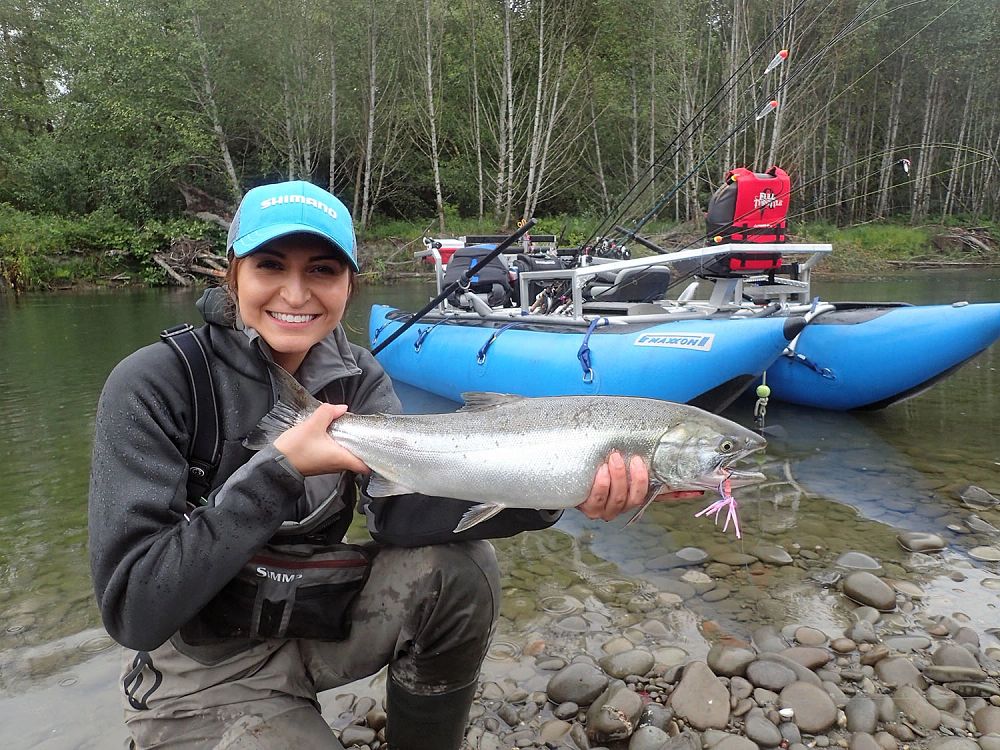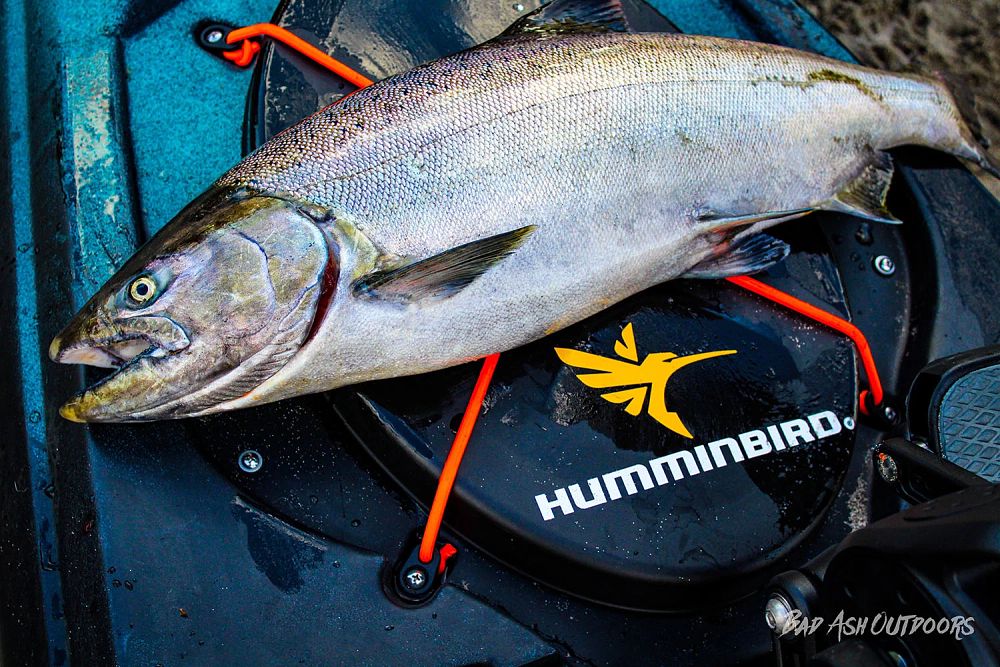CONNECTING TO YOUR ROOTS: A PROFILE ON ASHLEY NICHOLE LEWIS
Johnson Outdoors has long recognized diversity and inclusion in the work of its many brands. Humminbird, Minn Kota, and Old Town are especially proud of the hard work and dedication of ambassador Ashley Nichole Lewis. Ashley is not only an esteemed salmon and steelhead guide, but also a TV program producer and a graduate scholar in the field of Indigenous and Environmental History.

A member of the Quinault Indian Nation, Lewis was born in western Washington. Raised off of the reservation and disconnected from her culture as a youth, as Lewis aged she sought out what it meant to be an indigenous person. Encouraged by tribal elders to spend as much time as possible on Quinault homeland, Lewis found answers to her questions while communing with other Quinault people and fishing the area's many salmon and steelhead waters. This led to a great deal of self-discovery.
What follows is an interview with Lewis in her own words, a chronicle of how she has become one of the most forward-thinking voices in the sport of fishing.
What's your background in fishing?
"Fishing has been a way to understand my indigenous identity, but going back, my family lived by modest means. Our family vacations were to parks and local rivers and places like that, so fishing was always kind of a part of that experience. My mother taught us to fish, so that knowledge was passed down through her as it often is in our culture. Then, spending a lot of time on the Quinault Indian Reservation, I decided that I wanted to guide because I was good at steelhead and salmon angling and I really like teaching others. So I started a business doing exactly that and it was amazing-Facebook wasn't quite what it is now, so I wasn't really involved in the social media scene, but word-of-mouth for a good guide on the peninsula spread quickly and I had full bookings toward the end of my first season. It was really exciting for me.
With all that time on the peninsula-you see the same rivers day in and day out, and over the years you start to see different size salmon runs and how the river might be eroding here or there and different problems. I would hear my peers talk about what it was like five or ten years ago and we started talking about the ever changing and declining fish runs of steelhead and salmon in the Pacific Northwest. It really made me more curious about why these places were changing so quickly and why our fishing on the reservation was so different. We faced a lot of the same problems, but certainly not in the same ways as our neighbors to the south on the Columbia and our neighbors to the north who were facing issues of conservation.
So, with a couple of dollars in my pocket from guiding I decided to go back to school and finish my undergraduate degree- in Native American Studies at the University of Washington, which was the best decision I ever made because I was learning a lot about indigenous tribes of the northwest and their history and then I was going out on the peninsula on the weekends and seeing the result of those histories. I would come back to the university and mold those experiences with my scholarship and go back onto the peninsula and learn more. The kind of education I got from the river and the university were equally important. That's how fishing has evolved in my life."

You're currently in graduate school. What is the focus of your studies?
"Yes, I'm currently a graduate student at the University of California, Davis, and getting my Ph.D. in Indigenous and Environmental History. What prompted this return to the university are all of my experiences in the outdoors. It is my belief that we are not at a place anymore where we can promote all of these individuals to be anglers and hunters without guiding them to understand what kind of impact we have on the environment and understanding the short-term and long-term repercussions. Going back to graduate school, getting a firm education in the environmental history of these places and the northwest indigenous history, my hope is to better inform folks and share a bigger picture about what kind of impact we have on these places and where we've been that have led us to where we are now. Going forward, I'd really like to do research at a university and also consult environmental organizations, indigenous organizations, and tribal nations and help them maintain their sovereign treaty rights and continue to manage their own natural resources and help other outside organizations understand what tribal sovereignty actually means."
You've been recognized for the work you've done on TV and how different your show was from other outdoors programming. Please fill us in.
"I had a show called 'Break Out with Bad Ash' on NBC Sports. That was a show that was centered around getting folks involved in trying outdoors activities. I'm known as an angler and a guide, but I also hunt and forage for mushrooms and I'm a skilled clam digger out on the coast. If it's outside and I can eat it, there's probably some form of interaction I've had with it. Thinking about these experiences, going back to my childhood I thought everybody got up at 5 am on the weekends to go and dig for clams, so we had something to eat all week. With those experiences I wanted to share that with other people, especially those who felt like the outdoors maybe wasn't for them. We do a good job at capturing certain demographics in our industry, but a poor job of getting women, people of color, and other minority groups involved. I wanted to change that with my program. A lot of the things we did on the program were very accessible to folks who maybe didn't have a vehicle to transport themselves places. A lot of the things we did were accessible by transit like urban space foraging. We showed higher level experiences too like fishing in the straits and how to catch trout in a high mountain lake with just a bobber and some Powerbait. We tried to give everyone a little bit of something to do outside, which we found very impactful especially as we were doing this during COVID.
We worked with Nick's Adventure, a kayak shop out of Portland, and Johnson Outdoors' brand, Old Town, was a big supporter of the show. They helped us get set up with our kayaks, which we got from Old Town. We did a lot of kayak fishing on the show given kayaks are such an accessible entry point versus fishing in a boat. We wanted to show how easy it really is. I was able to have a lot of success and fun thanks to Old Town and our network of sponsors." 
Speaking of televised coverage, you were also one of the guests on Johnson Outdoors' "One Boat Challenge". How was that experience?
"I got the call from Humminbird and Minn Kota that they had this idea for a project called the One Boat Challenge. They could tell me some, but they couldn't divulge a lot. I knew I was going to Mexico and there would be a bass fishing competition, but I really didn't have any more information than that. I have a good relationship with my friends at Johnson Outdoors, so if they say it's going to be a fun thing I know it's going to be a fun thing. So I agreed. I was dropped off at a lake in the middle of Mexico with a Vexus bass boat, Humminbird fish finders, and a Minn Kota trolling motor and set off in a competition against a host of other anglers Johnson Outdoors had contacted. I'm not a bass angler-I'm a salmon and steelhead angler-I know a little bit about some of the lures and the techniques, but I really wouldn't call myself an experienced bass angler by any stretch. So the real challenge was how I pick this up quickly, become effective, and what tools do I have that will work to my advantage in the competition.
The Humminbird fish finders and one boat network definitely made that possible. I can't believe how easy the Humminbird units and Minn Kota trolling motor were to use. If I had been dropped off on the bank with a rod and reel I would have been super lost, but with the Humminbird and Minn Kota one boat network opened up a realm of possibilities that allowed me to be a hunter on the lake and not just a wanderer. I hadn't used Humminbird fishfinders much and aside from the Minn Kota I strap to the back of my drift boat, I wasn't very experienced with the equipment. I found the equipment very practical to use. It's always great when you get a piece of equipment to use and the functions are intuitive. With nobody saying how it works you can at least go in and be able to switch through different charts and understand where you are besides the various sonar screens providing real-time fish-finding. You can with little to no instruction be dangerous with these technologies. Unfortunately, my team was eliminated early on in the competition, but we had a fantastic experience. It was still fun."

Overall, what's it been like working with Johnson Outdoors?
"It's been great! I was able to spend some time with the Johnson Outdoors teams prior to the One Boat Challenge and ever since the relationship has only strengthened. What I really like about each of the respective teams I work with at Johnson Outdoors is they have a sense of forward thinking that I think a lot of companies lag behind on. When we have conversations about what my role is as a pro staffer, the conversations are rarely "we want you to promote this or that product". The conversations typically involve looking at what impact the brands have on a specific outdoors community and how to get better at communicating positive branding messages. I had a conversation with Old Town about how they want to properly cite the indigenous people whose languages have been used in the naming of many canoes and kayaks. We discussed how working with the indigenous tribes in their area is very important as a form of reconciliation. With Humminbird, we've discussed a lot about conservation because
Humminbird has products that excel at finding fish. We've discussed what these brands' responsibilities are to teach anglers how to be mindful of what this technology can do to fish populations. So we're always talking about things that not only impact anglers, but our society and environment in a larger sense."
Johnson Outdoors is proud to be connected and have a relationship with Ashley Nichole Lewis. Ashley's work in guiding and promoting indigenous and environmental history is inspiring and we're proud to highlight it. To read more stories like this that are connected with our entire family of brands, jump over to our Outdoor Adventure Blog. Also, to learn more about Ashley Nicole Lewis, visit her website at https://badashfishing.com.
Tagged Fishing